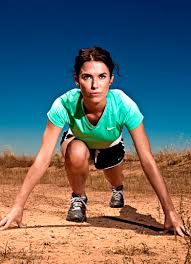记忆方法
谐音:爱死你的、爱使力的 →刘翔是个伟大的运动员(athlete),得了很多冠军,很多女fans 总
喜欢说我“爱死你的”
喜欢说我“爱死你的”
中文词源
athlete 运动员
来自拉丁词athlos, 竞争。
英语词源
- athlete
-
athlete: [18] The etymological idea underlying athlete is ‘competing for a prize’. Greek āthlon meant ‘award, prize’, whence the verb athlein ‘compete for a prize’. Derived from this was the noun athlētés ‘competitor’. The context in which the word was most commonly used in Greek was that of the public games, where competitors took part in races, boxing matches, etc. Hence the gradual narrowing down of the meaning of athlete to ‘one who takes part in sports involving physical exercise’, and even further to ‘participant in track and field events’.
- athlete (n.)
- early 15c., from Latin athleta "a wrestler, athlete, combatant in public games," from Greek athletes "prizefighter, contestant in the games," agent noun from athlein "to contest for a prize," related to athlos "a contest" and athlon "a prize," which is of unknown origin. Before 1750, usually in Latin form. In this sense, Old English had plegmann "play-man." Athlete's foot first recorded 1928, for an ailment that has been around much longer.
权威例句
- 1. The boy first showed promise as an athlete in grade school.
- 这个男孩在上小学的时候就初次显示出成为运动员的潜力。
- 2. The athlete is checked by their physio or doctor.
- 由专用理疗师或医生为运动员做检查。
- 3. He is a terrific athlete and a brilliant jumper.
- 他是个出色的运动员,弹跳力非常好。
- 4. The athlete received a two-year suspension following a positive drug test.
- 该运动员因尿检结果呈阳性而被停赛两年。
- 5. Derartu is an outstanding athlete and deserved to win.
- 德拉尔图是位优秀的运动员,赢得比赛也是理所当然。

